
Rivista di Psicolinguistica Applicata-Journal of Applied Psycholinguistics
Scope & Guideline
Empowering Research in Language and Psychology.
Introduction
Aims and Scopes
- Multimodal Communication and Syntax:
The journal investigates how different modes of communication (e.g., verbal and non-verbal) interact, particularly in children with developmental language disorders. - Bilingual Education and Curriculum Development:
There is a consistent emphasis on bilingual education, examining various approaches to teaching languages in multilingual contexts, particularly for deaf and hard-of-hearing students. - Psychological Analysis of Language Use:
The journal delves into the psychological aspects of language, including how language shapes identity and emotional expression, as well as its role in cultural contexts. - Developmental Language Studies:
Research often focuses on the acquisition of language skills in children, including studies on morphological awareness and language development in bilingual versus monolingual settings. - Social and Emotional Aspects of Language:
The journal explores how language interacts with social behaviors and emotional development, particularly in early childhood and special education contexts.
Trending and Emerging
- Integration of Multimodal Learning Strategies:
There is an increasing focus on how multimodal resources (e.g., gestures, visual aids) enhance language learning and communication, particularly in bilingual and deaf education. - Exploration of Embodied Cognition:
Research exploring the connections between physical actions and language development is gaining traction, emphasizing how embodied experiences influence cognitive processes related to language. - Impact of Technology on Language Learning:
Studies examining the role of digital tools and online platforms in language acquisition and communication are emerging, reflecting the changing landscape of education in the digital age. - Cultural and Emotional Dimensions of Language:
The journal is increasingly addressing the emotional and cultural dimensions of language, investigating how language shapes identity and social interactions in diverse communities.
Declining or Waning
- Analysis of Traditional Language Teaching Methods:
Research on conventional language teaching methods has become less prevalent, as the focus shifts toward more innovative and integrative approaches that address the needs of diverse learners. - Linguistic Studies on Non-Standard Dialects:
There appears to be a waning interest in studies solely focused on non-standard dialects or vernaculars, as researchers increasingly prioritize bilingualism and language acquisition in formal educational settings. - Cognitive Linguistics in Isolation:
Cognitive linguistics topics, while still relevant, are being integrated into broader discussions of language use in social contexts rather than being examined in isolation.
Similar Journals
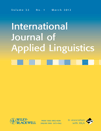
International Journal of Applied Linguistics
Connecting Theory and Practice in Applied LinguisticsInternational Journal of Applied Linguistics, published by WILEY, is a premier platform for cutting-edge research in the field of applied linguistics. With a notable Impact Factor and ranked in the top Q1 quartile of linguistics and language, this journal serves as an essential resource for scholars, practitioners, and students. The journal’s wide-ranging scope includes various subfields such as language acquisition, language education, sociolinguistics, and discourse analysis, fostering multidisciplinary approaches to language studies. It has achieved a significant Scopus Rank, placing it in the 90th percentile for both Arts and Humanities as well as Social Sciences categories, reflecting its high visibility and influence in the academic community. The International Journal of Applied Linguistics is committed to advancing the understanding of language use in real-world contexts through rigorously peer-reviewed articles that contribute to both theory and practical applications. While it is not an open-access journal, it remains a highly respected publication for researchers looking to disseminate and acquire knowledge in applied linguistics.
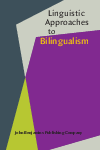
Linguistic Approaches to Bilingualism
Exploring the Nuances of BilingualismLinguistic Approaches to Bilingualism, published by John Benjamins Publishing Co, stands as a leading journal in the field of linguistics, particularly recognizing the complexities and nuances of bilingualism. Established in 2011, this journal has quickly risen to prominence, achieving a Q1 ranking in Linguistics and Language as of 2023, underscoring its impact and relevance within the academic community. With an impressive Scopus ranking that places it in the top 12% and 13% in the Arts and Humanities and Social Sciences categories respectively, it is an essential resource for researchers, professionals, and students alike. The journal aims to publish innovative and interdisciplinary research that contributes to a deeper understanding of bilingual language processing, acquisition, and usage, making it invaluable for those studying the interplay of language and cognition. Although it does not currently offer open access options, its rigorous peer-review process ensures that each publication meets the highest academic standards, fostering insightful discussions and advancements within the field.
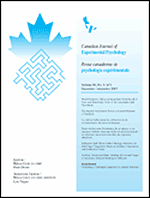
CANADIAN JOURNAL OF EXPERIMENTAL PSYCHOLOGY-REVUE CANADIENNE DE PSYCHOLOGIE EXPERIMENTALE
Connecting Minds: Bridging Research and PracticeCanadian Journal of Experimental Psychology / Revue canadienne de psychologie expérimentale (ISSN 1196-1961, E-ISSN 1878-7290), published by the Canadian Psychological Association, serves as a vital resource in the fields of Experimental and Cognitive Psychology and general psychological research. With a respectable impact factor that places it in the Q3 category for both Experimental Psychology and miscellaneous Medicine (2023), this journal offers a platform for innovative research that furthers our understanding of psychological processes. Spanning years from 1993 to 2024, it connects researchers, professionals, and students to contemporary findings and methodologies, fostering a collaborative environment for the advancement of psychological science. Though it does not currently offer Open Access, the journal's commitment to quality and relevance in psychological research continues to make it an important part of the academic landscape, supporting the dissemination of knowledge within a global community.

Languages
Connecting scholars to the heartbeat of language research.Languages, published by MDPI, is a prestigious open-access journal dedicated to the field of Linguistics and Language studies. Since its inception in 2016, this journal has rapidly established itself as a leading platform for high-quality research, achieving an impressive Q1 ranking in 2023 and standing out in both the Arts and Humanities as well as the Social Sciences categories with significant percentile rankings (76th and 74th respectively). Based in Switzerland, Languages fosters an international community of scholars who are committed to exploring the multifaceted dimensions of language, from theoretical frameworks to practical applications. With a robust e-ISSN of 2226-471X, the journal prioritizes accessibility, allowing researchers, professionals, and students to freely engage with cutting-edge research and insights. By bridging the gap between theory and practice, Languages plays a crucial role in advancing our understanding of linguistic phenomena, making it an invaluable resource for anyone invested in the study of language.
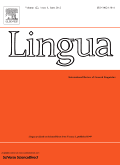
LINGUA
Elevating discourse in the study of language.LINGUA is a premier academic journal dedicated to the field of linguistics, published by ELSEVIER and based in the Netherlands. With an ISSN of 0024-3841 and an E-ISSN of 1872-6135, this esteemed journal has garnered a reputation for excellence, evidenced by its position in the top Q1 quartile in Linguistics and Language as of 2023. LINGUA serves as a vital platform for scholars, researchers, and students, showcasing innovative research and critical discussions across various linguistic subfields. The journal has demonstrated impressive Scopus rankings—151 out of 1088 for Language and Linguistics, and 176 out of 1167 in Social Sciences—placing it in the 86th and 84th percentiles, respectively. By providing a forum for the dissemination of advanced linguistic theories and their applications, LINGUA continues to significantly contribute to the academic community, making it an essential resource for anyone engaged in the study of language.

Psycholinguistics
Advancing Understanding at the Intersection of Psychology and Linguistics.Psycholinguistics is a distinguished academic journal published by the STATE HIGHER EDUCATIONAL ESTABLISHMENT in Ukraine, specializing in the intersection of psychology and language. Since its inception, this journal has transitioned to an Open Access model in 2017, offering unrestricted access to its rich repository of research that contributes to the field's understanding of cognitive processes and linguistic functions. With an impressive Q2 classification in Linguistics and Language and a Q4 classification in Experimental and Cognitive Psychology as of 2023, Psycholinguistics garners significant attention among scholars, evidenced by its notable rankings in Scopus. The journal serves as a vital platform for researchers, professionals, and students, enabling the dissemination of innovative findings and theoretical advancements in psycholinguistics. Its commitment to high-quality scholarship and open access makes it a valuable resource for those engaged in the exploration of language acquisition, processing, and cognitive aspects of linguistic behavior.
Address: VUL SUKHOMLYNSKOHO 30, PEREYASLAV-KHMELNYTSKYI 08400, UKRAINE.
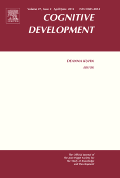
COGNITIVE DEVELOPMENT
Transforming Perspectives on Developmental PsychologyCognitive Development is a prestigious academic journal published by Elsevier Science Inc, focusing on the critical area of developmental and cognitive psychology. With an ISSN of 0885-2014 and an E-ISSN of 1879-226X, this journal serves as a vital platform for the dissemination of innovative research, theories, and methodologies from 1986 to the present, with the latest articles contributing to a comprehensive understanding of cognitive processes in children and adolescents. Positioned in the second quartile (Q2) of both the Developmental and Educational Psychology and Experimental and Cognitive Psychology categories, Cognitive Development holds an essential place in shaping contemporary psychological research, boasting robust Scopus rankings of #175/360 and #90/165 in its respective fields. Though not an open-access journal, it provides valuable insights and rigorous studies essential for researchers, professionals, and students engaged in the intricate processes of cognitive development. Whether you're looking to publish significant findings or simply stay updated on the latest advancements, Cognitive Development is an indispensable resource in the psychological community.
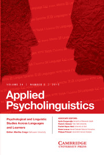
APPLIED PSYCHOLINGUISTICS
Advancing Insights in Language and PsychologyApplied Psycholinguistics, published by Cambridge University Press, is a premier journal in the fields of linguistics, psychology, and cognitive science, with a focus on the intersection of language and psychological processes. Since its inception in 1980, the journal has consistently provided a platform for high-quality research, achieving impressive rankings in various categories as of 2023, including Q1 status in Linguistics and Language, and Q1 in Psychology (miscellaneous). With a focus on experimental and cognitive psychology, it fosters the exploration of language acquisition, social communication, and cognitive mechanisms underlying language use. Although it is not available as an Open Access journal, its rigorous peer-review process and impactful articles make it a significant resource for researchers, professionals, and students alike. The journal's commitment to advancing knowledge is evident through its contributions to both theoretical and applied psycholinguistic research. Whether you're a seasoned researcher or a student eager to delve into psycholinguistics, this journal serves as an essential resource for keeping abreast of cutting-edge developments in the discipline.

DEVELOPMENTAL SCIENCE
Pioneering Research in Human Growth and LearningDEVELOPMENTAL SCIENCE, published by Wiley, is a premier international journal dedicated to advancing the field of developmental psychology and cognitive neuroscience. With an ISSN of 1363-755X and an E-ISSN of 1467-7687, this journal has established itself as a vital resource for researchers and practitioners alike since its inception in 1998. The journal is esteemed for its rigorous peer-reviewed articles that explore key aspects of human development, contributing to its remarkable impact factor and prestigious rankings: it is categorized in Q1 in both Cognitive Neuroscience and Developmental and Educational Psychology, placing it in the top tiers of scholarly work. Notably, it holds an impressive Scopus rank of #30 out of 360 in Developmental and Educational Psychology and #19 out of 115 in Cognitive Neuroscience. The continuous exploration of developmental processes, education, and cognitive functions makes DEVELOPMENTAL SCIENCE an indispensable tool for those striving to deepen their understanding or contribute to these dynamic fields. Although the journal follows subscription-based access options, its high-quality findings offer invaluable insights for academicians, students, and professionals committed to the evolving landscape of developmental research.
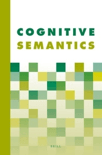
Cognitive Semantics
Decoding Language Through Cognitive LensesCognitive Semantics, published by BRILL, is a leading academic journal dedicated to the intricate study of cognitive processes underlying language use and semantic meaning. With its ISSN 2352-6408 and E-ISSN 2352-6416, this journal contributes significantly to the fields of linguistics and language studies, reflecting its importance in contemporary research on cognitive linguistics. Over its publication span from 2015 to 2024, it has established a niche as a Q3 ranked journal in the Linguistics and Language category for 2023, showcasing its relevance and growing influence in the academic community. Although currently not open access, the journal aims to provide a robust platform for exchanging ideas, theories, and methodologies related to cognitive semantics, fostering interdisciplinary dialogue among researchers, professionals, and students. Readers can expect to uncover valuable insights into the cognitive mechanisms that shape our understanding of language, making this journal an essential resource for anyone involved in linguistic research.